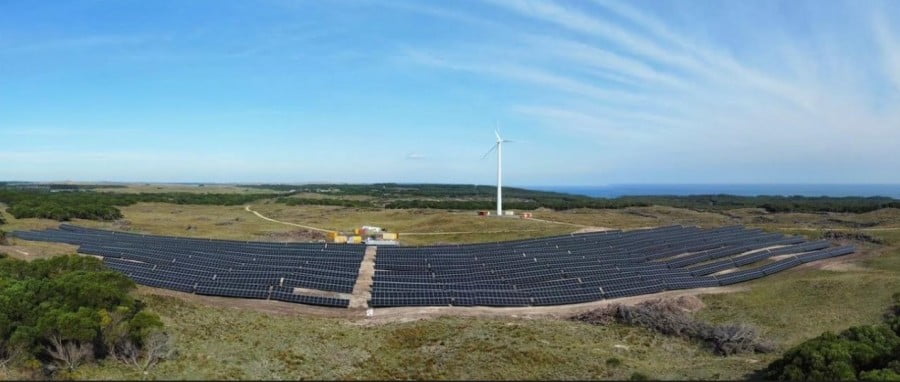King Island is again setting a global standard for hybrid renewable energy systems, with the completion of a new $3.35 million, 1.5MW solar farm set to further cut diesel use and carbon emissions.
Hydro Tasmania CEO Ian Brooksbank said the almost six-hectare solar farm, comprising 5,000 panels, was part of a long-term plan for King Island to transition away from diesel and to renewables.
“Over the past 10 years, we’ve slashed diesel consumption on King Island by 50 per cent. That saves 2.1 million litres of diesel and cuts carbon emissions by 5,700 tonnes a year,” Mr Brooksbank said.
“The new solar farm will save an additional 300,000 litres in diesel and 800 tonnes in carbon emissions annually and deliver even greater reliability in electricity supply for local homes and businesses.”
Mr Brooksbank said the first wind farm was installed on King Island 25 years ago, and subsequent expansions and technology advances meant the island had since become a leader in hybrid renewable energy systems.
“King Island has become a renewable energy blueprint for isolated off-grid communities in Australia and around the world and it continues to lead the way.
“This type of hybrid, renewable energy system is also a model for the national electricity market. How we integrate wind, solar and storage, while reducing fossil fuels and maintaining grid stability, is an important lesson as the nation transitions to renewable energy.”
Construction works were completed by GEM Energy and the solar will soon be connected to the local grid.
The King Island solar farm development is also part of Hydro Tasmania’s plans to achieve net zero reportable scope one and two emissions by 2025.
“Hydro Tasmania has a proud history of sustainability, and our renewable energy is helping the State achieve its own net zero targets,” Mr Brooksbank said.
“Committing to our own journey towards net zero emissions is the next step in our story. Our action plan is redefining the way we generate, distribute, and consume electricity, so we can address the impacts of climate change and help keep our planet healthy for future generations.”

